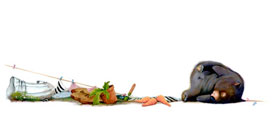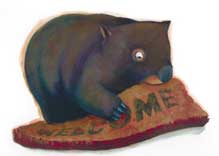Tom
Appleby is set more than 200 years in the past. The First Fleet and early years
of the New South Wales colony as seen through the eyes of a chimney sweep.
I think I've known
since I was a kid that I'd write a book like Tom Appleby one day- a book that
didn't follow all the myths of starving convicts and the rotting First Fleet
ships, but was based on first hand accounts of what really happened.
When I was small
my mother told me bedtime stories of early Sydney - stories from the books
she'd studied at university, bits from Watkin Tench's diary. She also told me
stories from my great something grandmother's diary, written in those early
years of the colony. The diary has been handed down from eldest daughter to
eldest daughter for nearly two hundred years, and it gives a very different
picture of life in the early colony from the one in the history books.
So from a child I
knew the story told in the history books at school wasn't absolutely true: the
convicts transported for stealing a loaf of bread, the rotting ships of the
First Fleet, the failed crops so people starved. (Apologies to all teachers for
the brat in the second row who kept telling them the school text books weren't
accurate!)
By
modern standards the journey of the First Fleet from England was hellish -
crowded, stinking, poor food, stale water. By the standards of the day,
however, it was a miracle voyage- in a nearly eight month journey only 3% of
Phillip's charges died, and those mostly from childbirth or illness they had
when they came aboard, far fewer than would have died if they had stayed in
prison in England, or even in the slums of London. There were no major
outbreaks of disease once the ships left England.
Phillip went to
extraordinary lengths to make sure the ships were sound, that the convicts were
fitted with good clothes and had as much fresh food as they could eat both
before they left and at Rio and Cape Town - not the salted or dried food that
was the staple for sea journeys at that time.
As for the barren
soil- blimey Charlie, this is Sydney we're talking about. The land at Sydney
Cove proved much less fertile than on the Hawkesbury or at Parramatta, and
wheat especially didn't thrive there. But vegetable gardens grew abundantly,
and so did maize and potatoes, vines and fruit trees. By September of the
first year Captain Philip wrote to Banks in England. 'Vegetables of all kinds
are in plenty in my garden and I believe very few want them but from their own
neglect'
Captain Tench also
recognised that given manure the soil of the colony would grow vegetables all
year round. The early gardens gave their owners massive potatoes, giant
cabbages, radish, turnips, beans, peas, tomatoes, endive, melons, cucumbers,
pumpkins, strawberries, rhubarb, spinach... ( The people who underestimate how
much vegetable food the early colony had obviously have never lived on their
vegetable garden!)
Fruit trees bore
too, and grew so quickly that the settlers were stunned: in two years apples,
oranges, figs, grapes and pomegranates and possibly others were bearing fruit.
Gardening freshly
cleared ground, however, was much harder work than the colonists had expected.
Though by 1790 nearly all the colonists, free or convict, had vegetable
gardens, many merely scratched the soil and didn't bother carting water in dry
times, or failed to add animal manure or even dig out tree roots.
The starving
colony is another myth, though there is good reason for it. For many of the
colonists believed they WERE starving.
Certainly the
first winter was difficult and scurvy and dysentery were a problem, though the
rations were eked out by the first vegetables grown in the colony, as well as
wild spinach, berries, seaweeds, game and other food, though fish seemed
scarce.
But by the first
summer vegetable gardens were providing abundantly, including such staples as
maize and potatoes and luxuries like melons, and there was wild food too.
Fish were
plentiful in summer. There was meat from kangaroos, parrots, wallabies, emus,
even though game was getting scarcer and powder for the muskets in short supply
too. The colony ate crows, ducks, swans, and probably wild eggs and oysters
as well.
In fact the
colonists were probably eating better than most of them ever had before - and
were healthier too. The medical records show a steadily improving state of
health, with improved fertility and lower death rate, very little scurvy -
presumably for those who refused native fruits and wouldn't eat vegetables -
and no sign of deficiency diseases like pellagra.
How has the myth
arisen?
To begin with, the
colonists WERE hungry - hungry for the food they were familiar with, in
particular meat and bread. Even when food was plentiful the marines and even
the convicts grumbled about having to eat fish instead of pork and beef, or
maize bread instead of wheat. Despite maize growing so much better than wheat
in the first years of the colony, more land was planted to wheat, simply
because they craved wheat flour.
REAL food back in
those days was bread and meat - preferably roasted. You only ate vegetables as
a garnish for the meat, or fish for a first course. Only the poor ate lots of
veg - and even the poor might have blade of beef for Sunday dinner, and a
pile of potatoes, cooked in the baker's oven.
Thomas Turner's
diary of the time (he was a not very well off shopkeeper) talked of suppers of
roast mutton, with a cold veal pastie, some fried veal, a cold ham, tarts etc -
and this was just at an informal meeting with friends. Another day he ate a knuckle
of veal and bacon, a beef pudding and hard pudding and turnips - the only
vegetables served in the entire meal!
By modern
standards the settlers at Sydney Cove expected to eat enormous amounts of
varied meats three times a day, accompanied by ale or spirits, bread and tarts
and puddings. Vegetables were simply not 'real food' at all.
But there were
real scarcities too - by 1790 tools were scarce, and the colony had run out of
candles, new clothes and many other necessities of a 'civilised life'. This added
to a feeling of isolation, of fear, of depression, a feeling that they had been
cut off from the world, as indeed they had. It was depression and uncertainty
that gripped the colony in these years, more than genuine hunger.
There is another
factor too. Our knowledge of those days comes from those able to read and
write, who wrote letters or diaries. They were the very ones to feel hungriest
for their proper diet of meat and bread, and to find eating large amounts of
vegetables so wearisome that often they went without. The marines official
dinners had to be foregone, for lack of meat and bread. Even Governor Phillip
was trying to ensure that the colony received the supply ships they desperately
needed - and not just for food. Nor could he be sure that the sporadic hunting
and fishing efforts would continue to be successful. He had to paint as black a
picture as possible.
The officers -
most of whom didn't want to be in Australia in the first place -were not
starving, though they may have thought they were. But they were depressed and
isolated and, at times, scared of what further scarcity might be to come.
Transported for Stealing a Handkerchief
Many convicts WERE
transported for just that - because if they had been convicted of the total of
their thefts they would have been hung, and judges wanted to give them a chance
in the colonies. So they were convicted on the smallest charge possible, so
they could escape the gallows. But most were genuine criminals, given a chance
of a new life in New South Wales. (And over half the convicts returned home
when they had served their sentence, preferring slums and poverty to free land
and hard work.)
No Trained Farmers
Governor Phillip
had been a farmer in Hampshire; many of the marines had farming backgrounds,
and some of the convicts had been farm labourers, if not farmers themselves.
Yet, many of the
convicts didn't know one end of a hoe from the other; nor were they interested
in tilling the land.
Most convicts, like Tom, had been educated in the morals of Newgate or the
prison hulks on the Thames, where you took what you could and thought mostly of
yourself or you didn't survive. They found it difficult to cooperate with each
other, much less with the land.
But some skill was
there and experience too, for those who wished to take advantage of it.
According to Governor Phillip in 1791, and other witnesses too, almost everyone
in the colony had their own garden and many had small orchards too.
Another good - but
exaggerated -tale is of the rapes and orgies on the first night the women came
ashore, but that rests on the report of a man who wasn't even there, a surgeon
on board ship. Captain Tench - who WAS there - just spoke of 'licentiousness'
when the men and women came together. It was probably a fairly wild party, but
not the horror it has been made out to be.
When I was a child
in the 1950s my grandmother felt it was important to tell me that even though
our family had been here since the early settlement, none of her ancestors had
EVER been convicts.
Actually almost
ALL of her ancestors who came to Australia had been convicts. All were well
off by the end of their lives- and carefully hid they had ever been convicts.
For them, as for
Tom in this book, Australia was a truly generous land.
|



